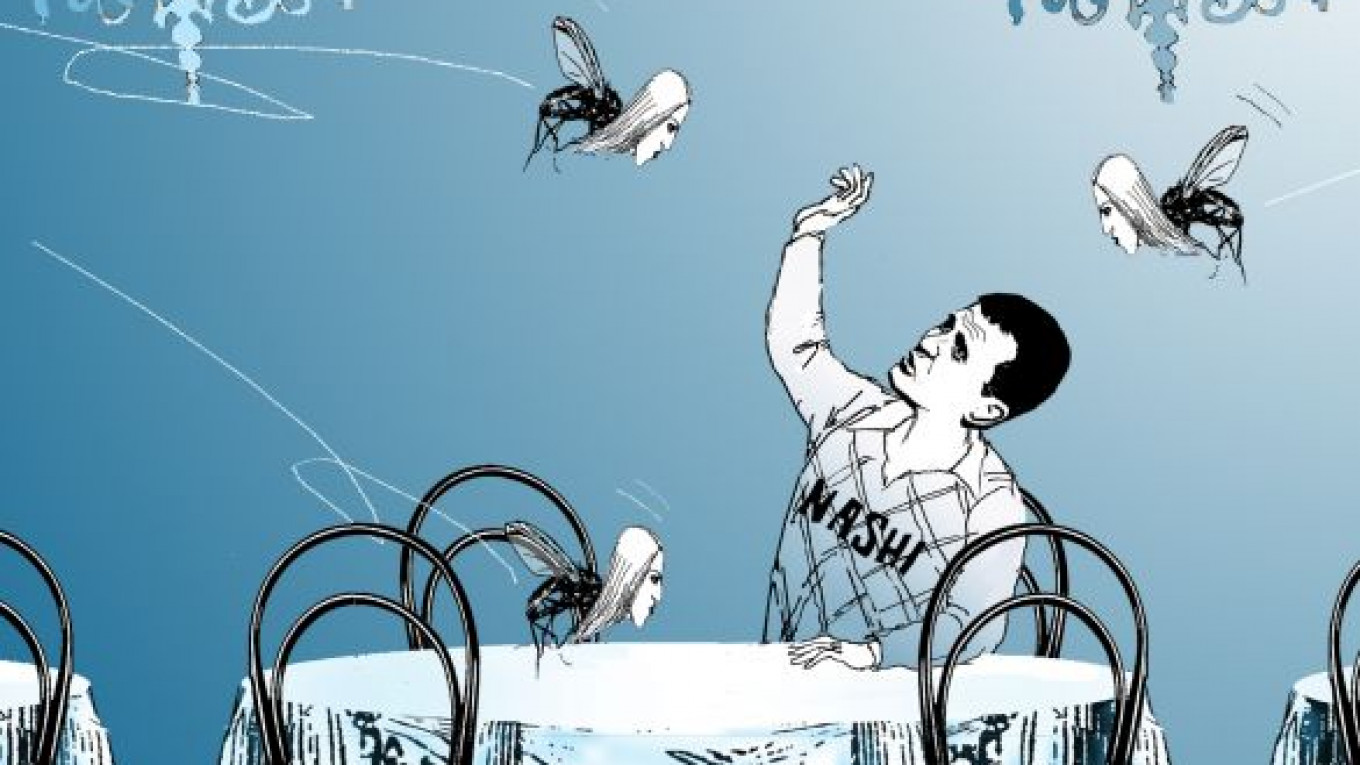This week, socialite and media personality Ksenia Sobchak caused a bit of a sensation in an Italian restaurant by going up and filming the founder of pro-Kremlin youth group Nashi, Vasily Yakemenko, having a pricey lunch with his wife.
Sobchak grinned malevolently into the camera before asking why Yakemenko was having lunch at “the most expensive restaurant in Moscow,” Mario. She then went up and asked him to give her an interview for GQ magazine, which he refused, saying he would only do it if she changed her opinion about him. She reproached him on his choice of lunch spot, saying: “It’s all right for me, I’m a socialite,” but that he should “give it all to the party, to Nashi.” Before disappearing in a puff of smoke, Sobchak wished Yakemenko — dressed in a white diamond-pattern jumper — a pleasant meal and recommended the Belon oysters. She then posted the whole thing on Twitter.
No real scandal there, you would think. After all, Yakemenko now heads something called Russian Youth and has a respectable salary, allowing him to eat as much linguine as he wants.
But the video caused a huge reaction, with many relishing the discomfiture of Yakemenko, a kind of Kremlin scoutmaster. It even got picked up by opposition blogger Alexei Navalny.
And Russian Youth’s spokeswoman Kristina Potupchik reacted furiously. In an extraordinarily outspoken blog entry titled “Why is Sobchak looking into other people’s plates?” she asked why a classy restaurant let in “cheap prostitutes like her.”
In an interview with Moskovsky Komsomolets, Potupchik suggested sweetly that Sobchak could not understand why Yakemenko was taking his wife out “since everyone knows about her unsuccessful attempts to get married.”
Even Interfax noted that “the press secretary had a more than impressive grasp of insulting words and descriptions.”
Yakemenko himself did not comment, telling Interfax that he had “nothing to talk about.”
But Russian Youth wrote to media demanding they remove the video from their web sites because it invaded Yakemenko’s private life, MK reported. Sobchak wrote on Twitter that the Metro newspaper was ordered to take down the video and remove mentions of Sobchak’s Twitter, which it refused to do.
Evidently enjoying the scandal, Sobchak didn’t turn a hair. She told Moskovsky Komsomolets that Potupchik’s attack made her think of the elderly ladies who gossip on benches.
And, “Adding a bit of bitterness to Yakemenko’s dolce vita won’t hurt,” she said.
Yakemenko is no stranger to looking into other people’s plates himself. He headed a ludicrously bullying campaign against overweight young people at the pro-Kremlin Seliger summer camp in 2010, when he told one bewildered man that “A person who eats more than necessary is stealing from his country and from Putin in particular.”
Yakemenko headed Nashi and its predecessor, Going Together, from 2000 to 2007. Last year there was a scandal when bloggers found a photo of Yakemenko with a blond girl, Anastasia Korchevskaya, a Nashi commissar. She apparently wrote in a caption that it was taken at Seliger 2008 and added that “Yakemenko still thinks I am madly in love with him,” Moskovsky Komsomolets reported.
A reply in the blog, seemingly from Yakemenko, said that: “If you twice came into my tent, which means once a year, and something happened, that does not mean that I think you are in love with me.” The posts were soon deleted.
A Message from The Moscow Times:
Dear readers,
We are facing unprecedented challenges. Russia's Prosecutor General's Office has designated The Moscow Times as an "undesirable" organization, criminalizing our work and putting our staff at risk of prosecution. This follows our earlier unjust labeling as a "foreign agent."
These actions are direct attempts to silence independent journalism in Russia. The authorities claim our work "discredits the decisions of the Russian leadership." We see things differently: we strive to provide accurate, unbiased reporting on Russia.
We, the journalists of The Moscow Times, refuse to be silenced. But to continue our work, we need your help.
Your support, no matter how small, makes a world of difference. If you can, please support us monthly starting from just $2. It's quick to set up, and every contribution makes a significant impact.
By supporting The Moscow Times, you're defending open, independent journalism in the face of repression. Thank you for standing with us.
Remind me later.






